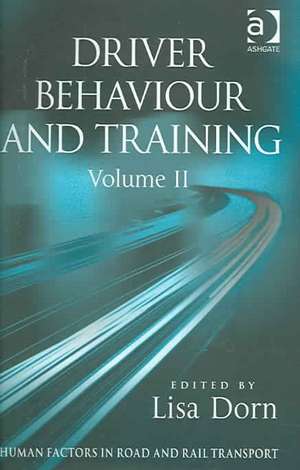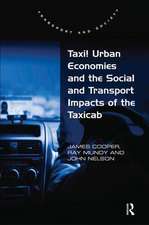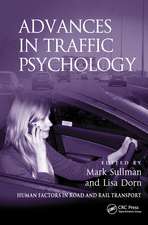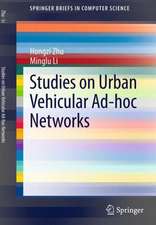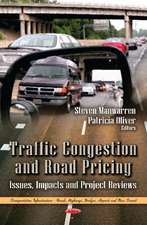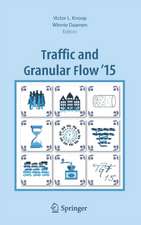Driver Behaviour and Training: Volume 2
Editat de Dr. Lisa Dornen Limba Engleză Hardback – 27 oct 2005
Preț: 744.43 lei
Preț vechi: 996.95 lei
-25% Nou
Puncte Express: 1117
Preț estimativ în valută:
142.47€ • 149.87$ • 118.87£
142.47€ • 149.87$ • 118.87£
Carte tipărită la comandă
Livrare economică 09-23 ianuarie 25
Preluare comenzi: 021 569.72.76
Specificații
ISBN-13: 9780754644309
ISBN-10: 0754644308
Pagini: 528
Ilustrații: Includes 88 b&w illustrations
Dimensiuni: 156 x 234 x 29 mm
Greutate: 1.14 kg
Ediția:New ed
Editura: Taylor & Francis
Colecția Routledge
Locul publicării:Oxford, United Kingdom
ISBN-10: 0754644308
Pagini: 528
Ilustrații: Includes 88 b&w illustrations
Dimensiuni: 156 x 234 x 29 mm
Greutate: 1.14 kg
Ediția:New ed
Editura: Taylor & Francis
Colecția Routledge
Locul publicării:Oxford, United Kingdom
Cuprins
1: Driver Training and Education; 1: Interactive Scenario Modelling for Hazard Perception in Driver Training; 2: An Analysis of the National Driver Improvement Scheme by Referral Type; 3: Assessment of Driving Training Courses; 4: Driver Education BSM Driving Instructor Training Programme; 5: Should Driver Education Include Training Against Instinctive Human Reactions?; 6: Cars, Sex, Drugs and Media: Comparing Modalities of Road Safety and Public Health Messages; 2: Simulation and In-Vehicle Technology; 7: Novice Driver Performance Improvement with Simulator Training; 8: Truck and Bus Driver Training, Can Simulation Contribute?; 9: The Potential to Enhance Older Drivers' Critical Driving Skills Through Simulator-Based Advice; 10: Microsimulation of Traffic for Safety Study of In-Vehicle Intelligent Transportation Systems; 11: Assessing Drivers' Level of Trust in Adaptive Cruise Control and Their Conceptual Models of the System: Implications for System Design; 3: Young Driver Behaviour and Road Safety; 12: Driver Education – A Difficult but Possible Safety Measure; 3: Identifying Young Driver Subtypes: Relationship to Risky Driving and Crash Involvement; 14: Development and First Evaluation of a Prediction Model for Risk of Offences and Accident Involvement Among Young Drivers; 15: Assessment of a Diary to Study Development of Higher-Order-Skills During Driving Experience; 16: Young Drivers' Attitudes Towards Risks Arising from Hazardous Driving Behaviours; 17: Prediction of Driving Accident Risk in Novice Drivers in Ontario: The Development of a Screening Instrument; 18: Seat-Belt Use by Spanish Adolescents; 4: Vulnerable Road Users; 19: Designing Powered Two Wheeler Training to Match Rider Goals; 20: Understanding the Increasing Trend of Motorcycle Fatalities: Rider Error, Driver Error or Training Error?; 21: Driving at Fifteen: Assessment of Moped Rider Training Among Teens; 22: Vulnerable Road User Safety: Social Interaction on the Road?; 5: Personality, Emotions and Driving; 23: The Transactional Model of Driver Stress and Fatigue and its Implications for Driver Training; 24: A Cross-Cultural Comparison of the Driving Anger Scale; 25: The Effect of Sensation-Seeking on Driver Fatigue; 26: The Use of Group Dynamics in a Driver Rehabilitation Course; 6: At-Work Road Safety; 27: Factors Influencing the Behaviour of People Who Drive at Work; 28: A Qualitative Analysis of Company Car Driver Road Safety; 29: Development of the Police Driver Risk Index; 30: Fatigue-Related Driver Behaviour in Untrained and Professional Drivers; 31: Predictors of Coach Drivers' Safety Behaviour and Health Status; 32: Comparing IT-Based Driver Assessment Results Against Self-Reported and Actual Crash Outcomes in a Large Motor Vehicle Fleet; 33: Differential Accident Involvement of Bus Drivers; 34: The Safety Value of Driver Education in Nigeria: An Assessment of Professional Driver Behaviour; 7: Crash Analysis; 35: The Application of Systems Engineering Techniques to the Modelling of Crash Causation; 36: The Application of Accident Script Analysis to Truck Crashes; 37: Non-Linear Methods for the Identification of Drivers at Risk to Cause Accidents; 8: Driver Attention and Knowledge; 38: Use of the d2 Test of Attention as a Predictor of Driving Proficiency; 39: Mental Models and Attentional Processes in Car Driving; 40: What Drivers Don't Know; 41: Transfer of Useful Field of Vision from Team Sports to Driving Skills in a Simulated Driving Test; Conclusion; Driver Coaching: Driving Standards Higher
Descriere
The objective of this second edition is to describe and discuss recent advances in the study of driving behaviour and driver training. It bridges the gap between practitioners in road safety, and theoreticians investigating driving behaviour, from a number of different perspectives and related disciplines
